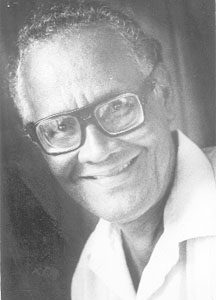
The limits of information
Everywhere in the world the ordinary man in the street has been brainwashed into supposing that the only thing that matters is economic success.

Everywhere in the world the ordinary man in the street has been brainwashed into supposing that the only thing that matters is economic success.
An important part of my life in the sugar industry, particularly the latter part, was spent battling the absurd concept that free trade is a universal good.

Intermittently through the year, and especially during memorable times up the immense and soul-redeeming Essequibo, I like to read Shelley – as we all should do from time to time since he is pre-eminently the poet of hope.

If the multitude of establishment executives spent one half the time spent at cocktail parties doing something constructive or creative Guyana would be an infinitely better place.

Many of us, at some time or another, generally as a new year beckons, have resolved to “keep a diary,” probably as part of some grand and comprehensive plan to organize one’s life better and achieve great things – plans, I am afraid, which very soon run aground on the dangerous

The best words for Christmas are from TS Eliot’s marvellous poem, ‘The journey of the Magi.’

I was distressed in conversation with a friend whom I admire for his level head, his learning, his insight, and his wit to hear him speak of his sense of being cramped for intellectual space, of his boredom with what seem to him the narrow opportunities in the country, of his disgust at the eternal back-biting which crowds out any hope of civil discourse.

On December 13, thirteen years ago, Martin Carter died. You know how it is when suddenly there is low voltage and the lights flicker low.
I have always been impressed by the advice the great French philosopher and mathematician, Blaise Pascal, gave a gambling friend of his who was inclined to doubt the existence of God.
Reading prevents your life ever narrowing down to the humdrum, the routine or the boring.
It seems not a day, and certainly not a week,
I hear the frequent chorus: “Poetry is boring,” “poetry is impossible to understand,” “poetry is irrelevant,” “poetry has no place in this computer age,” “poetry is for academics.”

The world is terror-stricken. A condition of advanced paranoia is spreading everywhere.
If I was younger, and the fierce fire burned in me, surely I would be among the protestors against the new order of things.

Giacomo Leopardi, who was to become one of the greatest poets of his time, was born in 1798 on his parents’ estate near the small Italian town of Recanati in the dusty hills above the Adriatic sea.
By what values should we strive to live in order to achieve a community in which differences are accommodated, a community where there is diversity of discourse but a recognition of the common good regardless of politics, religion, race and personal beliefs?
Someone read a column of mine and meeting me asked “What do you see in poetry, Ian?
I regret, if not exactly deplore, the cancerous growth of the shorter versions of the great game.

In Guyana education once deteriorated to the point where parents had little confidence that the formal system would or could produce results.

I am sometimes accused by bloggers, and often gently told by friends, that I am inclined to view life, and particularly life in Guyana, through a glass not darkly but beautifully rose-coloured.
The ePaper edition, on the Web & in stores for Android, iPhone & iPad.
Included free with your web subscription. Learn more.